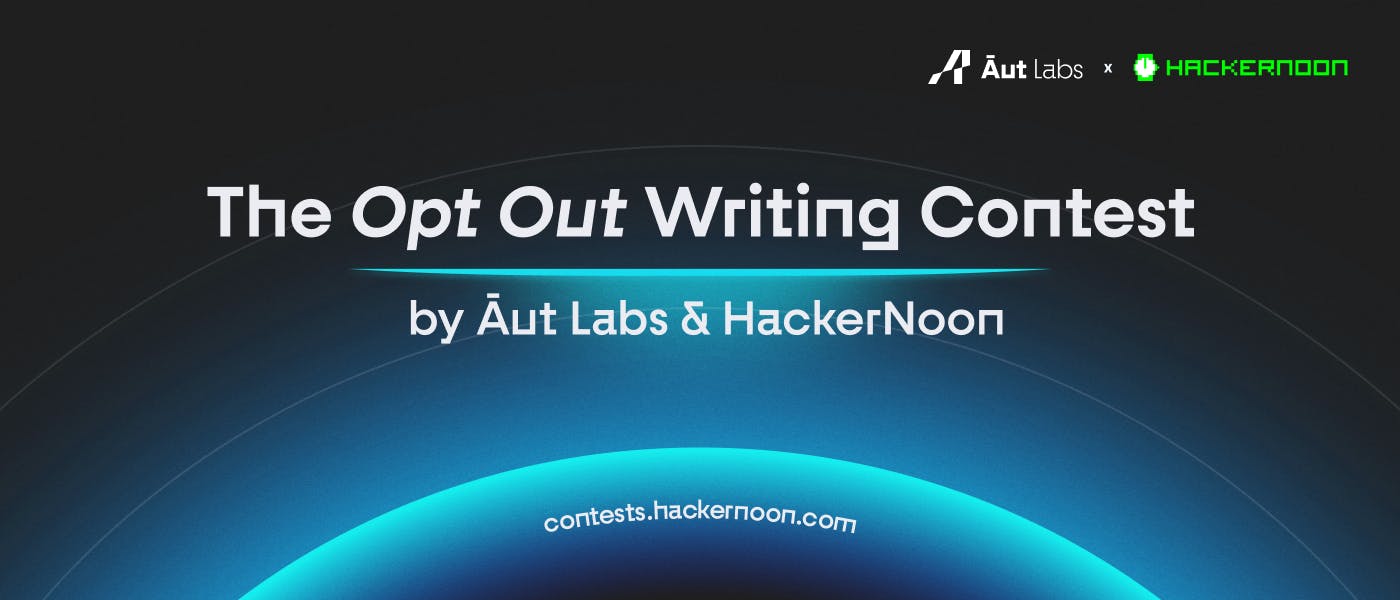Hi Hackers!
Our friends at Āut Labs have put together these writing prompts to help you create a standout entry for Theme 2 of the #OptOut writing contest—Create Your Own Standard. Draft your entry with a single prompt or tackle mutiple, related prompts in one go.
For more information, read the full contest announcement here.
Theme 2: Create your own Standard
Prompts per Tag.
#interaction:
-
A brief history of digital interactions. A walk down memory lane - how interactions evolved from the early Internet, through Facebook and contemporary social media. Anything from Tinder to TikTok has changed and redefined the way we communicate, understand and interact with each other. Go beyond the “better” and the “worse” of general opinions - and give us a straight, personal analysis of what matters, and inexorably shook human interaction to the bone.
-
A tech prompt. There are different approaches to tracking and measuring “interactions” in the decentralized web. From VC (Verifiable Credentials) to ZKP (Zero Knowlege Proof), to Āut’s Interaction Tree for context-agnostic, trackable interactions. Pick one, or compare them all - highlighting the reasons and design-thinking to pick one or the other. Be as tech-deep as you can. Astonish us, and get extra-points for diving deeper into the Interaction Tree and its design.
-
Real interactions. We want to hear a story about interactions that are “purposeless” - that do not have the finality to gain benefit from someone else’s work, knowledge or support. Interactions that are based on pleasure, and enjoyment, and genuine curiosity towards another human being. Give us something personal - in whatever style that suits you. From a memorabilia, to a short story, to a footnote at the bottom of your Master’s defense thesis.
-
The Dictatorship of Interactions. Can interactions truly be free, at a fundamental level? Can we unconditionally like, enjoy, or even hate someone that stands above or below us in what is commonly considered a social hierarchy? In simple terms: do “non-transactional” interaction truly exist - and should they? Or it was just a paleolithic form of DeFi all along?
-
Web3 as the Social fabric of digital Interactions. Should interactions be decentralized? Pro tip: yes, of course they should, that’s not the point. But what does “decentralized interaction” even mean? Explore how blockchain technology fundamentally reshapes social interactions, with a focus on shared ownership, incentivized participation, and contract-enforceable rules. Make it technical. Set a threshold to evaluate when we can consider an interaction enough-decentralized in the digital realm. And then boundaries, and tiers - till what point we can decentralize interactions. And the technical aspects of an “interaction protocol” - whether that’s a brand-new SocialFi dApp, or an entire protocol such as the interaction tree.
#reputation:
-
Reputation in the Digital Space: Traditionally, Reputation is that thing that everybody understands, and nobody can evaluate and measure objectively. Focus on the challenges and difficulties of evaluating someone’s reputation in the digital space, with a special focus on decentralized, fair reputation, and how to measure it. A tons of extra points if you dive deeper into the Āutonomy Matrix and Āut’s first-ever unified system to measure participation-based Global Reputation in a fully-decentralized environment.
-
The History of Reputation: That sounds like an obvious one…doesn’t it? Well. Reputation has been around for millennia. Pretty much every civilization who ever touched the earth had a way to establish a hierarchy between its citizens, members, and countrymen. But what is reputation today, and what should it represent in a decentralized, non-hierarchical society? Is it someone’s worthiness, their value in a community/group, their financial capability, their talent, their dedication? Pick an angle, and go as deep as you can. We don’t look for “yes-men” - we look for original thinkers that can bring an interesting angle up to the debate.
-
Collective Reputation: we talk DAOs, distributed nations, on-chain agencies. What in Āut’s ecosystem, and the Internet at large, we call a “hub.” A node of nodes, a group that gathers multiple participants by free association, without any legal or jurisfictional tie. Tell us what Reputation is inside a “hub” - inside a collective environment. What it is for you, what it is today, and how it’s going to evolve in the future. What is an individual’s reputation within a group? What is the threshold between individual and collective reputaton? This is a difficult one - new models, visual graphs, and brand-new, DAO-shaking processes are encouraged. References to Participation Score, Global Reputation, and other Āutonomy Matrix’s concepts get extra points.
-
Reputation use-cases: What does “reputation solve”? How does it disrupt the status quo? Talk us “fair credit score”, new financial instruments, UBI, decentralized insurance for decentralized workers, etc. Extra-points for references to $REPFI and Āut’s economy. Never heard of it? Reach out to us on Discord, and ask away!
-
The Reputation Nightmare: This is our Dystopian prompt. Tell us fictional stories. Speculate on how Reputation could potentially “break” the social/civil texture of what a community is, of what humanity is - with its flaws, and errors, and incorrigible taste for “wasted” energy and passion and drama. Will decentralized reputation “fix” humans, or will make the world a better place while letting us be what we have always been?
#trust:
-
The Essence of Trust: What is trust? Does it still matter today, or it’s an already passed and obsolete concept? Does it make sense to speak about trust in a decentralized environment, where all parties can rely on a mathematically verifiable system to take care of the common good? Wouldn’t “rely on this system” be a form of trust per-se? This is our speculative track about trust. Treat as you like - preferably with care, as it is said to contain flammable material 😎
-
Trust as a shiny armor, trust as a scarlet stain: This is the typical, never-ending debate between the analog vs. the digital, the old vs. the new. Has trust changed, evolved, degraded, …, in the digital era? Are the “relational …”, “real-world …” and “tech-powered …”, “decentralized …” trusts two separate concepts? And what are the errors, the fixable leftovers in one or the other? Is “trusting one another” a sign of weakness, or a super-power that makes us stronger as a collective being? Here you have it.
-
The Infrastructural Trust: Tech prompt right here. This is a difficult one, consider it as a win-all, lose-all scenario where you may get a secure win if done right, but most likely you’ll get it disastrously wrong. Up for a challenge? Here you go. What are the missing pieces of decentralized infrastructure for Trust not to be a philosophical, abstract concept, but something concrete, and measurable, and safe, that real-world people can rely on outside of the web3/d-tech bubble? Dive deep into protocol design, and gain points galore for (accurate) references to the Āutonomy Matrix and Āut’s unified system.
-
Decentralized trust in the real world: Āut’s unified system, the Āutonomy Matrix, makes measurable, verifiable reputation a reality for the first time in the history of humanity. Certainly, this is an achievement - but is it usable in the real world? Can you use your unparalleled on-chain effort to prove your trustworthiness at university, or at a book club, or as a pass to your gym? If yes, how? Be practical. Propose solutions, show results. The more concrete you get, the more we will consider to build your project together with you.
-
To trust or not to trust: Should we really be limited by old-world concepts such as “I can trust only who/what I know”? Or “decentralizing everything” means that we can “trust everything” only cause an algorithm, a protocol, the most beautiful mathematical function that was ever conceived tell us so? Where do we draw the boundaries, and what are we going to gain, and lose once moving beyond them? Whatever angle you decide to pick, make Daddy Hamlet proud.
Open Prompts:
-
[#interaction; #reputation; #trust] in [insert field]: The old, best writing advise: write about what you know. From literature, to robotics, to the legal system - write about one of the contest topics in relation to a specific field you are deeply knowledgeable or passionate about.
-
Āut is tendentially anarchist, anti-political, credo-agnostic. But good things come from any source. So here’s a quote that we like, from The Bible.
(…) It will not be so among you; whoever wishes to be great among you must be your servant, and whoever wishes to be first among you must be your slave. - Matthew 20:20-28, The Bible
We believe this incarnates the concept of “participation-based reputation” - where your work, and tasks and effort bring you individual benefits, while you serve the public goods, indiscernibly from your community. Explore it in the key that you like, adherent to one of the three main themes. Or just use it as an inspiration, and write about whatever you want :)
Ready to enter the #OptOut writing contest?
Good luck!

